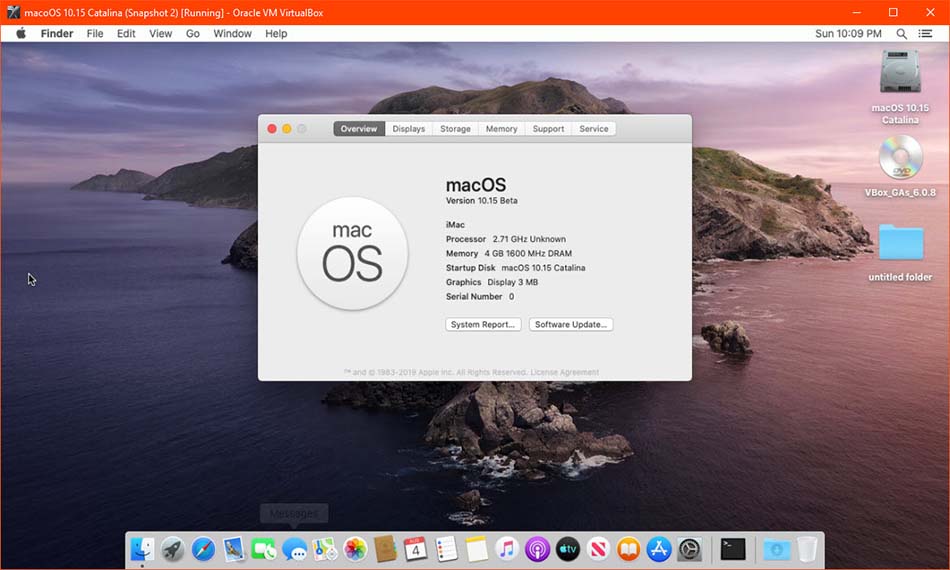As far as I know, in order to install a Mac OS, the host has to be running on Apple hardware. Not saying it won't work, but it's not supported, and would require a lot of tinkering to get it to work, if it works at all. People ask about this all the time on the VirtualBox forums. Here's their official message about it. Install macOS Catalina on VirtualBox on Windows PC. Install macOS Catalina on VirtualBox on Windows PC. What You’ll Need. Step One: Install VirtualBox on Windows. Step Two: Set Up A New Virtual Machine. Step Three: Configure macOS Catalina Virtual Machine. Step Four: Install VirtualBox Extension.
Last week we got some solid indications of what to expect from AMD's first Radeon RX 6000 GPUs, via the ROCm v3.8 Linux firmware file. As a reminder, Redditor stblr datamined the Radeon open compute firmware file and found references to some upcoming AMD Radeon RX 6000 GPUs. More specifically, stblr found indications that Sienna Cichlid (Big Navi or Navi 21) would have 80CUs and a 256-bit memory interface, Navy Flounder (Navi 22) would sport 40CUs and a 192-bit memory interface.
Sienna Cichlid and Navy Flounder pack 80 and 40 CUs, respectively, and to work out how many streaming processors (SPs) these designs feature one should multiply that number by 64 (assuming same arch as RDNA 1) giving 5,120SPs and 2,560SPs, respectively. This assumption appears to have been proven correct in some further data mining by stblr - this time digging through Apple's latest MacOS 11 Big Sur code.
Mac Os For Virtualbox Amd Radeon
Apple recently made this beta available, so anyone can dig within the files to verify stblr's findings. This code is naturally different from the ROCm in the way that it describes supported GPUs. A good thing about the difference is that the 'AmdRadeonX6000HwServices' file confirms specs like SP counts, clock speeds, and TDP indicators. However, some of these values, especially GPU/memory clock speeds, could well be subject to change ahead of official product launch.
Overall, in the data from the MacOS 11 Big Sur beta code, stblr reckons the following AMD Radeon RX 6000 GPU news nuggets were confirmed:
- Navi 21 and Navi 22 have significantly higher clocks than Navi1X.
- Navi 21 supports both HBM2 and GDDR6
- Navi 22 uses 16GT/s GDDR6 with a bus width of 192-bit for a bandwidth of 384GB/s.
- Navi 23 has 32 CUs and 128-bit memory interface.
- Navi 31 mostly has the same specs as Navi 21, but on RDNA 3 (gfx11).

Key remap for mac. There is also some data on upcoming APUs too, which is worth a look. Stblr asserts that the data uncovered confirms that 'Cezanne has the same GPU configuration as Renoir, Van Gogh has 8 RDNA 2 CUs, [and] Rembrandt has 12 RDNA 2 CUs (btw it also has VCN 3.1)'.
It covers all the rudimentary performance like trimming, cropping, clipping AVI files, and more. The installation only takes up a very short time like the whole program is extremely lightweight. The MP4 output is what it mainly features, other formats are available as well. Its interface is very easy to navigate and welcoming for how to edit AVI files in Windows 7. Avi files for mac.
In case you need a reminder, the AMD RDNA 2 event is scheduled for this time next month, 28th October.


Highly anticipated: One brave Redditor who trawled through the deep mines of macOS Big Sur code has uncovered preliminary specifications for AMD’s upcoming Navi 21, Navi 22, and Navi 23 GPUs. Although the information isn’t entirely precise, it’s sufficient to conclude that these will be very, very powerful GPUs.
Listed plainly and clearly within macOS code is the number of compute units each GPU will have: Navi 21 will have 80, Navi 22 will have 40, and Navi 23 will have 32. Assuming that each compute unit corresponds to sixty-four shaders, the GPUs will have 5120, 2560, and 2048 shaders respectively. The clock speeds for each GPU are a little more ill-defined, and we’ll explain why in a second, but the driver lists speeds from 2 GHz to 2.5 GHz.
There’s also a mention of a Navi 31 GPU with 80 compute units; 5120 shaders; but there’s no other info on that chip yet – that one’s still a year from release.
Radeon RX 6000
| Navi 21 | Navi 22 | Navi 23 | |
| Codename | Sienna Cichlid | Navy Flounder | Dimgrey Cavefish |
| Shaders | 5120 | 2560 | 2048 |
| Clock | 2050 MHz → 2200 MHz | 2500 MHz | |
| TDP | 200 W → 238 W | 170 W |
There was incomplete information on Navi 23. And fun fact: AMD's GPU codenames are generated randomly.
Our heroic Redditor extracted all this information from the “AmdRadeonX6000HwServices” file in the newest beta of macOS 11 Big Sur. The beta is publicly available and so this data is easily verifiable – the only caveat is the possibility that AMD provided prototype information to Apple, or that the architecture has changed so significantly that the terms we’re used to now mean something else, but those are unlikely scenarios.
Clock speeds and TDPs usually aren’t finalized until just before release, so it’s best to treat these values as rough guides that the processors are capable of. The table below shows that the specs for Navi 10 disagrees slightly with the specifications of the RX 5700XT, the current flagship Navi 10 GPU. Both the clocks and the TDP are higher.
Radeon RX 5000
Virtual Mac Os X Online
| Navi 10 / RX 5700XT | Navi 14 / RX 5500XT | |||
| Shaders | 2560 | 1536 | ||
| Clock | 1400 MHz | 1605 MHz | 1900 MHz | 1607 MHz |
| TDP | 180 W | 225 W | 110 W | 130 W |
On the left: the GPU specifications as described in macOS Big Sur, on the right: the top end model's actual specifications as currently sold.
Although 5120 shaders are a lot less than the 10,000 or so CUDA cores on Nvidia’s newest GPUs, AMD and Nvidia take a markedly different approach to their unified shader units, even though a lot of the terminology used seems to be the same.
Mac Os For Virtualbox Download
Nvidia's execution units (CUDA cores) are scalar in nature -- that means one unit carries out one math operation on one data component; by contrast, AMD's units (Stream Processors) work on vectors -- one operation on multiple data components. For scalar operations, they have a single dedicated unit. Further explanation of this is beyond the scope of this article, but you can check out our deep dive: Navi vs. Turing: An Architecture Comparison for more.
Obviously, there’s no telling exactly how fast Big Navi is going to be compared to Nvidia's RTX 30 series, for now at least. AMD is set to launch Radeon RX 6000 GPUs on October 28.
Mac Os X Iso Download For Virtualbox
Now Read This…
Macos Catalina Virtualbox Amd
Related Reads

